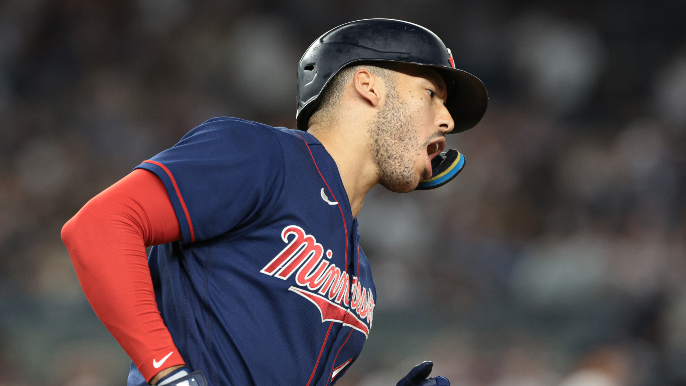
The Giants have some explaining to do.
This just doesn’t happen. Teams don’t sign superstar players, then, moments before officially announcing them, postpone their press conference. Then to back out on the deal and watch as Carlos Correa signed a reported 12-year, $315 million deal with the Mets?
Susan Slusser has more questions than answers, and joined the Murph & Mac Show with Markus Boucher and Marcus Thompson to discuss the Giants’ disastrous day.
She said that while teams can use medicals to back out of deals, she doesn’t believe the Giants did that, saying they were “potentially overcautious.”
“If I’m the Giants, I try to figure out someplace in the middle,” Slusser said. “I don’t know if they were aware that the Mets were kind of lingering and might swoop in, but maybe they could have come in with something a little less and still come away with Carlos Correa. They had to. There’s just nothing left on the market and they were so insistent they were going to make some noise this offseason.”
This puts the organization in a precarious position. Their whole m.o. of acquiring a superstar player this offseason has now fallen through.
Meanwhile, Slusser said, we have “no information” on exactly why the Giants backed out.
We need answers.
“I really think that they need to and we haven’t heard that they are going to address this. They might not. I think they need to,” Slusser said. “I think everybody would like to hear precisely what happened. What kind of soured the deal, if there were attempts to maybe come up with different numbers that might have worked for them that might have been more than what the Mets offered and what their next moves will be and who knows.”
While she said players usually have things flagged and discussed in their medicals, that’s natural. Athletes play sports that cause more than normal wear and tear on their bodies.
But that’s expected and usually not a dealbreaker:
“Almost any professional athlete, that scan is is gonna look a little weird.
So you’ve got to be able to bite the bullet and go, what’s his age? What’s his track record? How much time has he missed? What do we project — is he a guy who keeps himself in shape? What’s his reputation? Do we have the ability to get him enough days off, if that’s something that’s needed?
Maybe the Giants just felt like they were in a position where if they were going to spend that kind of money, they want him available for 150 games and they didn’t think they were going to get it. It might be that simple, but they need to explain that if that’s the case.”
This completely alters the Giants’ trajectory, and seemed to be avoidable.
Slusser said she heard from people in the free agent cycle that this was a cycle where it was important not to wait and be passive.
And while the Giants may have had health concerns, it’s evident they weren’t serious enough to rule him out for other teams:
If you land someone like Judge or Correa you can then get other big-name guys to come join your team. That not happening. This puts them back. They have to go bigger, they have to go bolder.
You can’t say overpay in a free agent market because the market is what you set. And I was told during this free agent market, the team has to be willing to set the market. You can’t follow the market. You can’t try to nickel and dime or try to edge someone out. You have to set the market.
The Giants have to be comfortable going out and setting a market and whether you consider that overpaying or blowing somebody out of the water, that’s what they’re gonna have to do. They kind of put themselves in that situation because they haven’t been willing to do it to date.
If they go out and spend and offer Aaron Judge $400 million early in the process, do they get him? Maybe.
If they take a look at Carlos Correa’s medicals and go like, ‘Meh, we don’t love them, but God, we really need this guy. We know we might be taking some risk here on the back end of this deal or he might miss X number of games per season with a bad back.’
That’s not uncommon. Think of how many athletes miss some games every year with a back thing.
That’s why we need to know, what did they see and how severe was it? If a guy has severe disc degeneration or something, okay, I get it, that’s that’s a valid concern. But it sounds to me like there were differing opinions, is what I was told. So clearly some other doctors think he’s pretty playable, he looks good.
The whole debacle puts the Giants in a position where, given the ascending state of the Arizona Diamondbacks, they could well finish in fourth place.
“Fourth is not a crazy call,” Slusser said. “The Diamondbacks not only are coming on strong, they gave the Giants as much trouble as any other team last year. That’s a good squad. So yeah, they’re in trouble.”
Listen to the full interview below. You can listen to every KNBR interview on our podcast page at knbr.com/podcasts or wherever you listen to podcasts.
Catch Murph & Mac weekdays from 6 a.m. – 10 a.m. on KNBR 104.5 / 680 and streaming live on KNBR.com.

